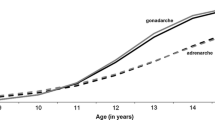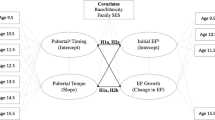Abstract
Developmental schedules refer to temporal factors of pubertal processes as they might bear on ego development. The longitudinal research reviewed here from the 30-year archives of the Guidance Study of the Institute of Human Development pertains to the effects of varying lengths of the prepubertal and pubertal period on the short-term and enduring integration of drive states initiated at puberty. The personality correlates of varying lengths of these periods serve as vehicle for establishing properties of these stages as well as of the transition between them. The different ways the sexes respond to the early onset of puberty, as reported here, may provide an important microcosm for understanding normative sex differences in the general regulation of drive states.
Similar content being viewed by others
References
Block, J. (1961).The Q-Sort Method in Personality Assessment and Psychiatric Research, Charles C. Thomas, Springfield, Ill.
Blos, P. (1962).On Adolescence, Free Press, New York.
Borenstein, B. (1954). A study of the relationship between Thematic Apperception Test fantasy and overt behavior. Unpublished doctoral dissertation, University of California, Berkeley.
Deutsch, H. (1944).Psychology of Women, Vol. 1, Grune and Stratton, New York.
Eichorn, D. (1963). Biological correlates of behavior. In Stevenson, H. W. (ed.),Yearbook Natl. Soc. Stud. Educ. 62: No. 1.
Erickson, E. (1956). The problem of ego identity.J. Am. Psychoanal. Ass. 4: 56–121.
Freud, S. (1958). Types of onset of neurosis. (Orig. publ. 1912.) In Strachey, J. (ed.),The Standard Edition of the Complete Psychological Works of Sigmund Freud, Vol. 12, Hogarth Press, London.
Freud, S. (1959). The question of lay analysis. (Orig. publ. 1926.) In Strachey, J. (ed.),The Standard Edition of the Complete Psychological Works of Sigmund Freud, Vol. 20, Hogarth Press, London.
Hartmann, H., Kris, E., and Loewenstein, R. (1949). Notes on the theory of aggression. In Greenacre, P., et al. (eds.),Psychoanalytic Study of the Child, Vols. 3, 4, International Universities Press, New York.
Jones, H. (1949). Adolescence in our society. InThe Family in a Democratic Society, Anniversary papers of the Community Service Society of New York, Colubmia University Press, New York.
Jones, M. (1965). Psychological correlates of somatic development.Child Develop. 36: 899–911.
Livson, N., and Peskin, H. (1967). Prediction of adult psychological health in a longitudinal study.J. Abnorm. Psychol. 72: 509–518.
Macfarlane, J. (1938). Studies in child guidance. I. Methodology of data collection and organization.Monogr. Soc. Res. Child Develop. 3: No. 6.
Nicolson, A., and Hanley, C. (1953). Indices of physiological maturity: Derivation and interrelationships.Child Develop. 24: 3–38.
Peskin, H. (1963). Possible relations of growth to early psychic experiences. Paper read in symposium Biological Time. Meetings of the Society for Research in Child Development, Berkeley, California.
Peskin, H. (1967). Pubertal onset and ego functioning.J. Abnorm. Psychol. 72: 1–15.
Peskin, H. (1972). Multiple prediction of adult psychological health from preadolescent and adolescent behavior.J. Consult. Clin. Psychol. 38: 155–160.
Rapaport, D. (1945).Diagnostic Psychological Testing, Vol. 1, Year Book Publishers, Chicago.
Schmidt, M. (1965).Somatische und psychische Faktoren der Reifeentwicklung, Johann Amrosium Barth, Munich.
Tanner, J. (1962).Growth at Adolescence, Charles C Thomas, Springfield, Ill.
Author information
Authors and Affiliations
Additional information
This research was supported by Grant MH 06238-02 from the U.S. Public Health Service, grants from the Ford Foundation, and a grant to the author from the Foundations' Fund for Research in Psychiatry.
Received Ph.D. in psychology from the University of California. Main research interests are longitudinal study of personality development and validation of psychoanalytic concepts.
Rights and permissions
About this article
Cite this article
Peskin, H. Influence of the developmental schedule of puberty on learning and ego functioning. J Youth Adolescence 2, 273–290 (1973). https://doi.org/10.1007/BF02213700
Received:
Issue Date:
DOI: https://doi.org/10.1007/BF02213700




